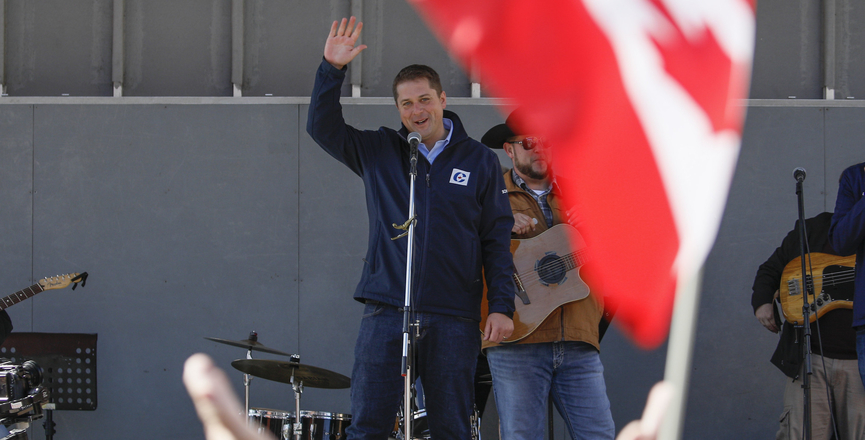Who said, “At time of global economic instability, Canada’s government must stand unequivocally for keeping the country together”?
I won’t tease you. It was Stephen Harper, on December 3, 2008.
Then-prime minister Harper, desperate to avoid a non-confidence vote in Parliament that was certain to defeat his Conservative government and be followed by a minority Liberal-NDP coalition, raised the spectre of the separatist Bloc Québécois propping up the coalition in a televised address to the nation. “At a time like this, a coalition with the separatists cannot help Canada,” he stated unequivocally.
There was to be no coalition with separatists, of course. That was just spin. But the Bloc had agreed to keep the coalition in power for a spell, possibly until the next constitutionally required election, and that was enough to unhinge many voters in Alberta.
Harper’s argument resonated powerfully here. Naturally, it was reported abundantly and favourably by our reflexively Conservative mainstream media. More importantly, though, it was repeated constantly by ordinary Albertans, in letters to the editor, on the internet and, of course, in office chat and at family dinners.
Even many of that minority of Albertans who understood that having another party or a coalition of parties try to form a government after a ministry has fallen on a vote of confidence is a normal and democratic part of our Westminster parliamentary system seemed to buy the argument there could be no truck or trade with separatists.
In the event, the matter was moot. Harper worked out an undemocratic and possibly unconstitutional deal with governor general Michaëlle Jean and Parliament was prorogued without a vote of confidence. After that, the Liberals replaced leader Stephane Dion with the calamitous Michael Ignatieff. Jack Layton, leader of the NDP, would thereby become Opposition leader in 2011 and Harper was able to continue as prime minister for seven more years.
This is relevant today, of course, in light of the so-called “Buffalo Declaration,” the much-publicized 6,000-word screed published by four Conservative MPs from Alberta that essentially tells Canada: Do what we want or Alberta will separate from Confederation and found an independent state, maybe with Saskatchewan along for the ride.
In other words, the Buffalo Declaration is essentially the position supposedly advocated by the Bloc for Quebec, at least as understood on the Prairies.
Near the top of the must-do buffalo agenda, according to Michelle Rempel Garner, Glen Motz, Blake Richards and Arnold Viersen, was federal approval of the uneconomic and environmentally controversial Teck Frontier oilsands mine.
This would likely have been granted regardless by the Liberal government of Prime Minister Justin Trudeau later this week, had it not been for Teck Resources Ltd. president Don Lindsay’s surprise announcement yesterday that the Vancouver-based resource company was pulling the plug on the project.
Reading Lindsay’s Sunday Surprise letter to federal Environment Minister Jonathan Wilkinson, the implication was clear: Teck walked away because it realized without the former Alberta NDP provincial government’s Climate Leadership Plan the project would never have the social license needed to proceed.
Also doubtless in the company’s calculations, conveniently left unsaid, was the real possibility oil prices will never recover sufficiently to make the project economically viable.
Regardless, Alberta Premier Jason Kenney and his extensive online support machine went into an immediate apoplectic meltdown last night, blaming it all on Trudeau’s reluctance to have police crack skulls at Indigenous rail blockades and hysterically denying UCP policies could have had anything to do with it.
Readers can now expect a renewed frenzy of wexiteering by the Conservative party’s buffalo wing.
Now, obviously, the Buffalo Declaration does not represent the views of all Conservative MPs, or even all Alberta Conservatives. But is it a trial balloon that enjoys deep support in the party’s powerful Alberta and Saskatchewan caucuses.
In other words, the Conservative Party of Canada, which as the Official Opposition in Parliament purports to be the government of Canada in waiting, is at best now a coalition with a group of separatists, and at worst nothing more than a regional separatist party itself like the Bloc.
If Harper was right in 2008 as the vast majority of Albertans then believed he was, how can Andrew Scheer, who remains Conservative leader for the time being, tolerate this situation in his parliamentary caucus?
Or is any position now taken by the party entirely situational and likely to be completely hypocritical?
If the Conservative Party of Canada is to retain any credibility, the gang of four who attached their names to the Buffalo Declaration must either leave the caucus or recant significant parts of the program they have endorsed.
If the party will not deal with this separatist rump within its caucus, Canadians outside Alberta, where doublethink already appears to be no problem on any number of Conservative positions, will be right to abandon the Conservatives as nothing more than a “Saskalbertan” bloc.
As much as I disagree with most of the positions taken in recent years by the CPC, I recognize that Canada needs a strong opposition Conservative party to represent the many Canadians who hold such views.
But if the Opposition leader is unprepared to deal with this separatist contagion in his caucus, that party can no longer be the Conservative Party of Canada.
David Climenhaga, author of the Alberta Diary blog, is a journalist, author, journalism teacher, poet and trade union communicator who has worked in senior writing and editing positions at The Globe and Mail and the Calgary Herald. This post also appears on his blog, AlbertaPolitics.ca.
Image: Andrew Scheer/Flickr



